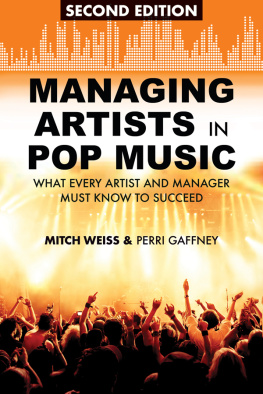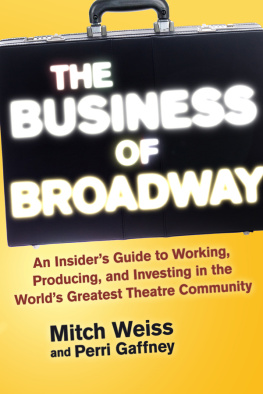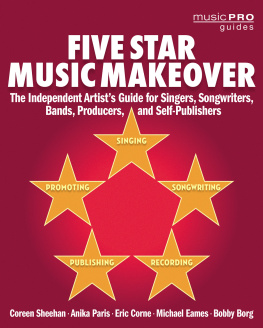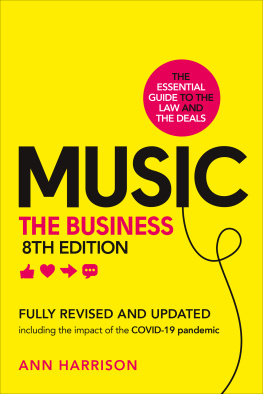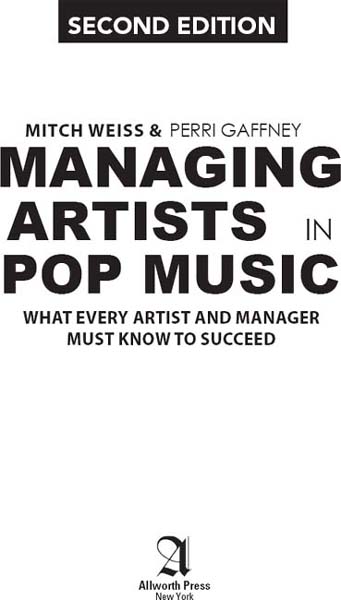
Copyright 2012 by Mitch Weiss and Perri Gaffney
All rights reserved. Copyright under Berne Copyright Convention, Universal Copyright Convention, and Pan American Copyright Convention. No part of this book may be reproduced, stored in a retrieval system, or transmitted in any form, or by any means, electronic, mechanical, photocopying, recording or otherwise, without the express written consent of the publisher, except in the case of brief excerpts in critical reviews or articles. All inquiries should be addressed to Allworth Press, 307 West 36th Street, 11th Floor, New York, NY 10018.
Allworth Press books may be purchased in bulk at special discounts for sales promotion, corporate gifts, fund-raising, or educational purposes. Special editions can also be created to specifications. For details, contact the Special Sales Department, Allworth Press, 307 West 36th Street, 11th Floor, New York, NY 10018 or .
15 14 13 12 11 5 4 3 2 1
Published by Allworth Press, an imprint of Skyhorse Publishing, Inc.
307 West 36th Street, 11th Floor, New York, NY 10018.
Allworth Press is a registered trademark of Skyhorse Publishing, Inc., a Delaware corporation.
Visit our website at www.allworth.com
Cover design by Adam Bozarth
Library of Congress Cataloging-in-Publication Data is available on file.
ISBN: 978-1-58115-882-3
Printed in the United States of America
Contents
PART I:
THREE DAYS IN THE LIFE
PART II:
CONTRACTS ANALYSIS FOR MANAGERS AND ARTISTS
Preface: The Buck Starts Here
A good manager's mantra: I don't know but I'll find out.
Attention: The Occupational Safety and Health Administration (OSHA) has determined that the maximum safe load on my butt is two persons at one time unless I install handrails or safety straps. As you have arrived sixth in line to ride my ass today, please take a number and wait your turn.
A good manager spends a ton of time on his and his client's finances and banking, paperwork, bill-paying, next-year's projections, fact-checking, resource-gathering, promotion materials, insurance, budget-cutting conceptsall the boring stuff of business. A good manager must also be prepared to deal with payola demands, homophobia in the radio business, sexism and racism (which are still alive and well in the music industry), massive numbers of charity requests, an airline industry determined to make the cost of touring impossible, paparazzi and demanding press people, and all those family members who think they know everything about the music biz.
That said, there is nothing more important than being an expert at communication with people, and I don't mean social-networking. I mean taking massive amounts of time to communicate every decision and logistical detail that might affect a staff person, artist, promoter, booking agent, accountant, lawyer, insurance broker, sound engineer, songwriter, or family membereverything they might need to know in order for them to excel in their individual work on behalf of your artist and yourself. It's a lot of time and work because it involves editing the information and repeating the information over and over again... tactfully!
Unfortunately most young managers and artists think a manager's primary job is to develop an artist's career and find work. If you didn't know it before, money talks when it comes to development. Lots and lots of money. So let's explore the myths and discuss reality in this new world of instant global notoriety courtesy of American Idol and X Factor.
The music industry is somewhere between chaos and flux. Technology and the Internet continue to affect every rule of artist development, music creation, promotion, sales and distribution, and the source of an artist's and manager's income. The public has new expectations and the industry is still struggling to catch up to its consumer base. The revised edition of this book combines the new digital age with the ageless principles that dictate success or failure in the music industry.
The new options and obstacles faced by managers and artists today are explored in detail from the manager's perspective. To the extent that every artist should learn to be his/her own manager, then this book is just as much for both the established and the hopeful artist as it is for the professional manager.
To make this book more accessible, we tell the story of one manager over a three-day period, providing important lessons in negotiating, artist handholding, and crisis resolution. Through a fictitious client list, we are able to describe in detail real things that have happened, based on firsthand and secondhand experiences known to the authors.
Along with this storyline, we offer cold facts through data boxes, on subjects ranging from choosing a pension plan, selecting a road manager, creating an effective press release, and analyzing a sample recording deal, paragraph by paragraph, in plain English.
The bottom line is to find success and happiness in what we do. Our business is to help singers, musicians, and songwriters do the same. In this regard, the buck starts here.
Three Days in
the Life
1
The Day Begins
Wanted: A job that will allow me to be creative, unrestricted, inspired, happy, productive and FILTHY RICH!!
Happiness is not a state to arrive at, but rather a manner of traveling.
I'm an independent managerno golden parachute plan in case of early termination by some ranting acid-rock diva and no large staff racing down the hall to copy contracts and get my lunch. I do have a wonderfully motivated intern, Robert O., who gives me twenty hours a week. The rest of the time I have my invaluable assistants, the computer and the cell phone.
Walking down the street on the way to my office reflecting on the music groups and solo artists I have managed and the many others that remain out there to be tapped, it amazes me that some people still think that a recording contract will make them happy. Getting a recording deal rarely means that you'll be making money. People should be actively pursuing the things that will make them happyand most people have never even thought in those terms. Not just music people, but people in general. Being a music performer is a job, like other jobs, but it's been glamorized and romanticized so much. And many performers, even famous ones, still believe the hype.
Today, I'll try to resolve a booking problem with BoyBand, a well-known pop rock group that continues to pack stadiums, but hasn't been able to get a new record deal after a decade in the business. When I walk in the door, I expect to find Max X., lead guitarist for the reggae-rock recording group RRU, who wants to speak with me confidentially about what he suspects is mismanagement from his group's current representation. I've agreed to talk to my friend's nephew John about his expected career in hip-hop. No doubt he has a clothing line ready to go. There will be calls to promoters, booking agents, attorneys, accountants, and other managers interrupting anything I may be doing. And an agent has asked me to accept a call from Jeremy R., a successful young Aussie horn player who recently immigrated to the U.S. I've got to make an appointment with the lead singer of Goodness, a Marvelettes-style four-girl oldies group, who is trying to revive her dormant career. And hopefully Pollyanne Heart, that Grammy-winning country singer, will call back. She wants me to translate her manager's explanation about why she has no money. I guess I should have her talk with other bankruptcy victims like Toni Braxton, Billy Joel, MC Hammer, TLC, and a whole slew of record labels.
Next page
